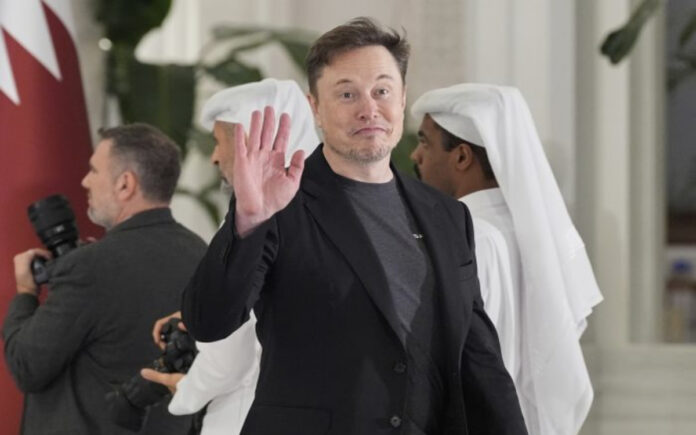Washington/Doha: Elon Musk, the billionaire entrepreneur who emerged as the Republican Party’s most generous donor during the last U.S. election cycle, announced plans to significantly reduce his political spending. His remarks—delivered at an economic forum in Qatar—mark a potential turning point as Musk faces mounting pressure from investors to refocus on his sprawling business ventures.
“In terms of political spending, I’m going to do a lot less in the future,” Musk said. “I think I’ve done enough.”
Musk, who reportedly poured close to $300 million into Donald Trump’s presidential campaign and aligned Republican efforts in 2023, also reaffirmed his commitment to lead Tesla for another five years. The announcement comes amid heightened scrutiny over his dual role as a business leader and political actor—particularly after his appointment to head the Trump administration’s Department of Government Efficiency, which has overseen sweeping federal cost-cutting measures.
Despite signaling a retreat from high-profile political activity, Musk clarified that he might re-engage politically under specific circumstances. “If I see a reason to do political spending in the future, I will do it,” he said.
A White House source downplayed the shift, stating Musk remains deeply invested in the Trump administration’s goals. The source noted that Musk continues to support Trump through advisory roles, private donor networks, and informal influence channels. “The president supports Musk’s decision to rethink how visible a supporter he wants to be,” the source added, describing the move as a tactical response to increased political criticism.
Investor Concerns and Political Fallout
Musk’s proximity to Trump and ownership of the social media platform X have fueled backlash, leading to consumer protests and declining Tesla sales. Tesla reported its first annual delivery drop last year, and early 2025 figures show a further 13% decrease in the first quarter. Analysts attribute some of this decline to Musk’s controversial political positioning.
His decreased visibility in politics could alleviate pressure on Tesla and other Musk-owned companies, including SpaceX, as investor concern mounts over his time allocation. To that end, Musk previously reassured investors he would limit his time with the Department of Government Efficiency to “a day or two a week” starting May.
He reiterated his priority: “reasonable control” of Tesla is essential to his continued leadership. Musk has publicly stated he’s unwilling to grow Tesla’s AI and robotics divisions without securing 25% voting control.
Changing Political Dynamics
America PAC, Musk’s primary political action committee, declined to comment. The billionaire’s retreat could pose challenges for Republicans, forcing them to rely more heavily on traditional mega-donors and grassroots fundraising as they gear up for the next congressional election cycle.
“Could it have an impact? Maybe, but it may not because there are lots of other places to raise money,” said veteran GOP strategist Ron Bonjean. “Musk made it easier. But now that Trump is president, he’s the fundraiser in chief.”
Also Read | Canada Emphasizes G7 Finance Ministers’ Focus on Restoring Global Stability and Growth
Musk’s political spending previously made headlines for fueling one of the most expensive judicial races in U.S. history—more than $20 million went to support a conservative candidate in Wisconsin’s Supreme Court race. Despite the record investment, the liberal candidate won by a wide margin.
Musk’s Polarizing Image and Market Impact
Public sentiment around Musk remains sharply divided. A recent Reuters/Ipsos poll conducted May 12–13 found that 58% of Americans held an unfavorable opinion of him, while only 39% viewed him favorably. The gap is widest along party lines—Republicans largely support him, while Democrats view him unfavorably.
A source familiar with Musk’s role in the administration described him in April as “exhausted and exasperated,” particularly by the adverse effects his politics have had on his business ventures.
Nonetheless, Musk expressed optimism about Tesla’s future, noting that sales have recovered outside Europe and demand remains robust. His comments prompted a brief 3.3% uptick in Tesla shares before settling around a 1% gain. However, Tesla’s stock remains down nearly 20% since Trump’s inauguration, despite early enthusiasm over the administration’s regulatory support for robotaxis—an area Musk considers key to the company’s long-term value.
Also Read | Vessel Strikes from Oil and Gas Activities Endanger Rare Rice’s Whales in Gulf of Mexico
Reports earlier this month suggested that Tesla’s board was exploring CEO succession plans, though Chair Robyn Denholm refuted those claims.
As Musk recalibrates his role in national politics, the balance between his political influence and corporate leadership remains under close watch from both Wall Street and Washington.



